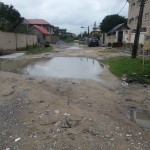Ki gbogbo Nigeria tó gba ominira ni àwọn Òṣèlú lábẹ́ olùdari Olóyè Ọbáfẹ́mi Awolọwọ ti fi owó kòkó àti iṣẹ́-àgbẹ̀ dá nkan ṣe fún gbogbo ilẹ̀ Yorùbá. Yorùbá jẹ èrè àwọn ohun gidi, amáyé-dẹrùn bi ilé-iwé ọ̀fẹ́, ilé-ìwòsàn ọ̀fẹ́, ilé iṣẹ́ amóhùn-máwòrán àkọ́kọ́, ilé àwọn àgbẹ̀ (olókè mẹrin-lé-lógún – ilé giga àkọ́kọ́), ọ̀nà ọlọ́dà, omi, iná mọ̀nà-mọ́ná àti bẹ́ẹ̀bẹ́ẹ̀ lọ. Àwọn ohun ipèsè wọnyi jẹ èrè lati ọ̀dọ̀ Òṣèlú tó fẹ́ràn ilú ti ó gbé wọn dé ipò, eleyi jẹ àwò kọ́ iṣe fún àwọn Òṣèlú ẹ̀yà ilẹ̀ Nigeria yókù.
Ìjọba Ológun fi ibọn àti ipá gbé ara wọn si ipò Òṣèlú, wọn fi ipá kó gbogbo ohun amáyé-dẹrùn si abẹ́ Ìjọba àpapọ̀. Lati igbà yi ni ilé-iwé kékeré àti giga, ilé-ìwòsàn àti ohun amáyé-dẹrùn ti Òṣèlú pèsè fún agbègbè wọn ti bẹ̀rẹ̀ si bàjẹ́. A lè fi ibàjẹ́ ohun amáyé-dẹrùn ti àwọn Òṣèlú àkọ́kọ́ pèsè fún ara ilú wọnyi wé ọbẹ̀ tó dànu,̀ ti igbẹhin rẹ já si òfò fún onilé àti àlejò.
- ọ̀nà ti ó bàjẹ́ – Bad road. Courtesy: @theyorubablog
- ẹ̀rọ mọ̀nà-mọ́ná – Power generator. Courtesy: @theyorubablog
- Dákú-dáji iná mọ̀nà-mọ́na – Incessant power cut. Courtesy: @theyorubablog
Òwe Yorùbá ni “Ọbẹ̀ tó dànù, òfò onilé, òfò àlejò” Àpẹrẹ pataki ni ọna àti ilé-iwosan ti ó bàjẹ́. Òfò ni ọ̀nà ti ó bàjẹ́ mú bá ara ilú nipa ijàmbá ọkọ̀ fún onilé àti àlejò. Ibàjẹ́ ile-iwosan jẹ òfò fún onilé àti àlejò nitori ọ̀pọ̀ àisàn ti kò yẹ kó pani ló ńṣe ikú pani, fún àpẹrẹ, itijú ni pé, Ọba, Ìjòyè àti Òṣèlú ńkú si àjò fún àìsàn ti kò tó nkan. Dákú-dáji iná mọ̀nà-mọ́ná ti ó sọ ilú si òkùnkùn jẹ́ òfò fún olówó àti aláini nitori, yàtọ̀ si ariwo àti òórùn, ai mọye enia ni ikú ẹ̀rọ mọ̀nà-mọ́ná ti pa. À ì sí Iná Mọ̀nà-mọ́ná àti Epo Ọkọ̀ bá Onílé pẹ̀lú Àlejò. Ìwà ìbàjẹ́, àbẹ̀tẹ́lẹ̀ gbi gbà fún ọ̀pọ̀lọpọ̀ ọdún ló da ọbẹ̀ ohun amáyédẹrùn danu.
Bi ọbẹ̀ bá dànù, kò ṣe kó padà, à fi ki enia se ọbẹ̀ tuntun, bi ó bá fẹ jẹ ọbẹ̀. Yorùbá ni “Ẹ̀bẹ̀ là nbẹ òṣikà, ki ó tú ilú ṣe”. Fún àtúnṣe, ó ṣe pàtàki ki gbogbo ará ilú parapọ̀ lati tún ohun ti ó ti bàjẹ́ ṣe nipa gbi gbé ogun ti iwà ìbàjẹ́ àti àbẹ̀tẹ́lẹ̀ gbi gbà.
ENGLISH TRANSLATION
Before the Nigerian Independence, Politicians under the leadership of Chief Obafemi Awolowo used the income from Cocoa and agricultural export to develop Yoruba land. Yoruba people benefitted immensely from the quality provision of infrastructure such as: free education; free health-care, Western Nigeria Television (WNTV) – the first of its kind in the Tropical Africa; Cocoa House (twenty-four storey – first sky scrapper in tropical Africa); tarred roads, public water; electricity etc. All these infrastructures were provided by the Politicians who loved their electorate, and it became exemplary for the other regions in Nigeria.
The Military who seized power by gun to force their way to leadership in place of Politicians, began “Unitary System” in place of “Federalism”, thereby taking over the Regional infrastructure under the Central Government. Since then, education – Schools, hospitals and other infrastructure that were provided by the Politicians as dividend of democracy began to decay. The destruction of infrastructure provided by the olden days Politicians can be compared to “Spilled Stew” that became a loss to both the Host and the Visitors.
Yoruba proverb said “The stew that spilled is a loss to both the Host and the Visitor”. A good example are the Roads and Hospitals that have decayed. Bad roads are loss to both Yoruba and non-Yoruba alike as accidents caused by bad road is not limited to Yoruba alone. Destructions of Hospitals is a loss to both the workers and the patients, as many illness which could not have led to death caused death. For example, it is a shame that Kings, prominent Nigerians including Politicians die abroad for medical problems that could been treated on time if the Hospitals were equipped. Incessant power cut throws the country into darkness is a loss for both the rich and the poor, because apart from the noise and air pollution, electricity generators has led to many deaths. Power outage and petroleum product scarcity, caused by several years of bribery and corruption led to the spillage of the infrastructural soup/stew.
When the stew is spilled, it cannot be recouped, the option is to prepare new stew if one is still interested in eating stew. Yoruba adage said “The wicked is appeased to take care of his/her town”. For corrections, it is important for the country to come together to reconstruct the infrastructure by kicking out bribery and corruption.
Originally posted 2016-04-08 11:31:39. Republished by Blog Post Promoter





